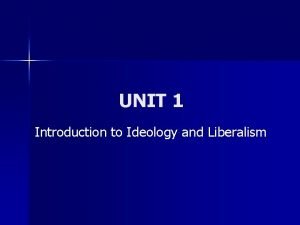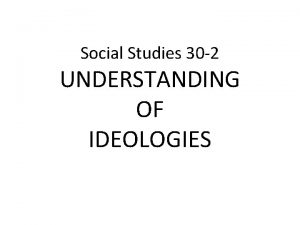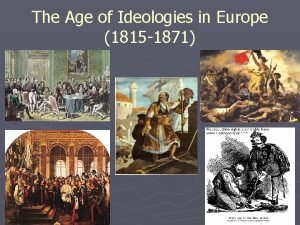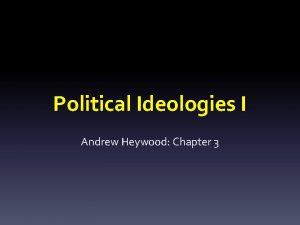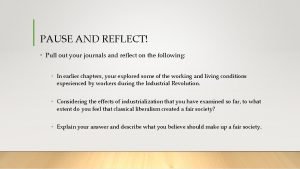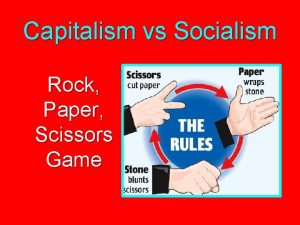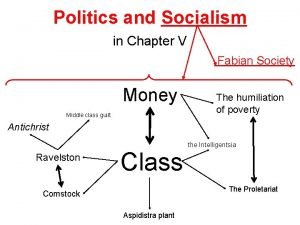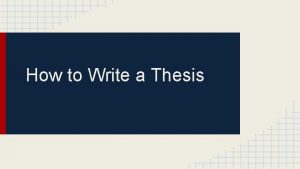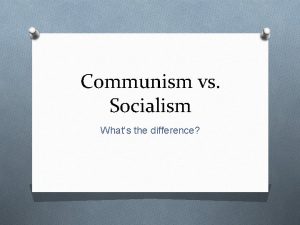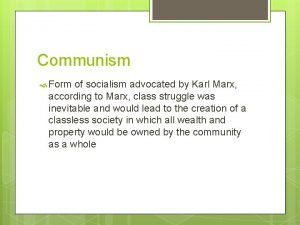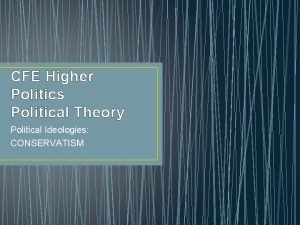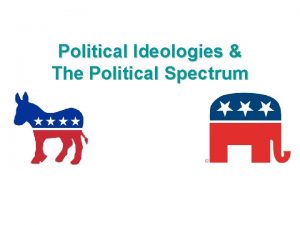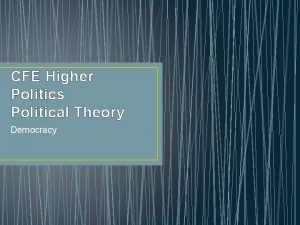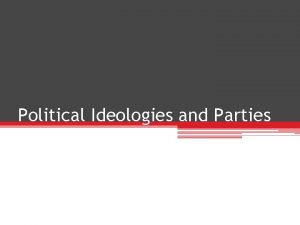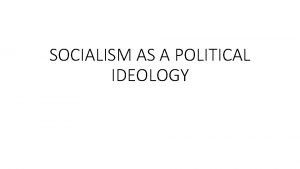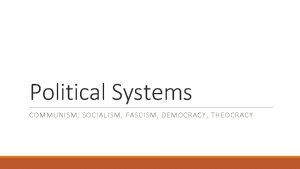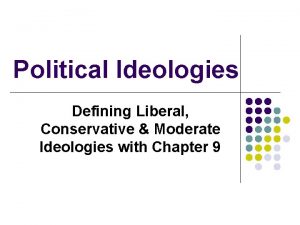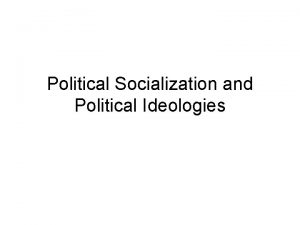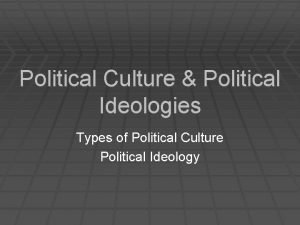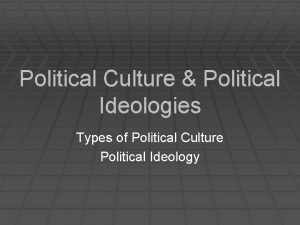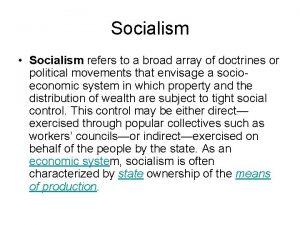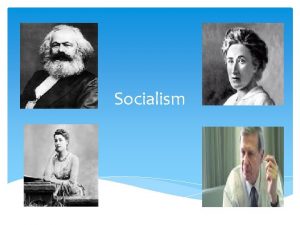CFE Higher Politics Political Theory Political Ideologies SOCIALISM





























- Slides: 29

CFE Higher Politics Political Theory Political Ideologies: SOCIALISM

Task • Read the handout on Socialism and answer the questions

Socialism as a political model • A fair society can never be created unless people are more equal This would require putting restrictions on individuals acquiring property and wealth This would also require a redistribution of wealth and income

Origins • Reaction to the industrial revolution • • Urbanisation Inequality Squalor Slums

Poverty of the working classes • Industrial society split into the ‘haves’ and the ‘have nots’ • Growth of the industrial working class • Poor living conditions • low wages • unsafe working conditions • long hours • exploitation

Key features • • • Cooperation Community Equality Social class Common ownership • Discuss the meaning of these terms and how they could relate to a description of how the world works and what it should be like in the future

Utopian socialists • Robert Owen • Belief that society could be ordered in a more just manner • Owen set up experimental communities based on social responsibility and equality • Tried to ‘advertise’ a more just form of society with the hope that it would catch on clip

New Lanark • The village first rose to fame when Robert Owen was mill manager from 1800 -1825. • Owen transformed life in New Lanark with ideas and opportunities which were at least a hundred years ahead of their time. • Child labour and corporal punishment were abolished, and villagers were provided with decent homes, schools and evening classes, free health care, and affordable food.

Scientific Socialists • Ideas founded in an study of capitalism and its effects on society • How it works, who benefits, who suffers, what happens as society develops, what needs to be changed, how things can work better • Conclusions drawn from this study of society as to how things can be changed for the better • Karl Marx • Das Kapital, The Communist Manifesto

Different strands of socialism Clip - Socialism socialism Marxism Democratic socialism Social democracy

Socialism • Socialist differ from conservatives in that they believe that the social/political environment influences people rather than the opposite. • This can be seen in socialist views on social policy • They believe that poor social conditions are a major factor in influencing how people behave Therefore better social conditions = better people

Socialism • Socialist view human nature as inherently good – rather than the conservative view of imperfect • The main problem for socialist in society is CAPITALISM • CAPITALISM encourages exploitation, inequality, greed and selfishness. • One class dominates over another and exploits them. • Socialist believe that if people can be made greedy by the system, they can also act the opposite way • i. e. cooperation

Private Property Private property is not the same as private possession: private property is that which is used in the process of production (land, factories mines, banks, businesses etc) 1. Private property is un-natural (the earth is given to mankind in general and no individual has the right to claim any part of it belongs to himself) 2. Claiming private property deprives someone else of its use (ie land) 3. Private property gives rise to inequality (those who have and those who have not: Bill Gates) 4. Private property gives rise to the exploitation by property owners of those who lack property (capitalists and workers: maximising profits by low wages and long hours) • Look over the 4 criticisms made of private property by socialists; what do you think are the most valid criticisms? Rank these accordingly and explain you top and bottom choice

Common ownership • A form of collectivism; the resources of society should be used for the benefits of society and not just for the benefits of a fortunate, small wealthy group • A means to achieve a more equal (and just) society • How can this be achieved? • Owned by the state on behalf of the workers? • Owned by everyone as shareholders • Owned by the workers? • Major difference between socialism and the other 2 ideologies

Private property and different strands of socialism • Disagreement as to how far to go ; • Should all property be owned by the state? • Is profit motive a good incentive? • What is the best method of distributing resources? : a free market or a command economy? • Should the workers own their own industries? • Marxists • All property is held by society, there is no private enterprise • Democratic socialists • Some large important industries are publically owned (nationalised): welfare organisations are publically owned and controlled • Social democrats • Very few industries are publically owned but welfare service remain publically owned and controlled

Different strand of socialism Marxism • • Influenced by Marx – 1818 -1883 Engels – 1820 -1895 Lenin – 1870 -1924

Marxism • Emphasises the importance of class struggle • See socialism as the natural development for society based on scientific analysis • Advocates revolutionary approach to overthrow of capitalism • Associated with communist systems in Soviet Union, Russian revolution

Different strands of socialism Democratic Socialism • Influenced by • Eduard Bernstein – 1850 -1932 • The Fabian society • Trade unionism

Fabian Society - 1884 • The Fabian Society is a British socialist organisation whose purpose is to advance the principles of democratic socialism via gradualist and reformist effort in democracies, rather than by revolutionary overthrow.

Democratic socialism • Influenced by Marx’s ideas but did not accept his revolutionary theories • The growth of the working class would mean they could use the democratic system to move to a socialist state • This move would be gradual and would require the education of the working classes so they could assume control of the government • It was not practical to replace all capitalist institutions at once, so socialism would be established through a gradual, step by step process • Associated with Labour Party in the UK up until 1997

The Labour Party - 1900 • Influenced by; • • Trade unionism Fabianism Ethical christianity Liberalism • Only limited influence of Marx Clip on history of Labour Party

Traditional Labour Party policy • Defence of parliamentary system of government • Pursuit of equal rights an equality of opportunity • State control of important industries (steel, electricity, coal, gas, telecommunications were all nationalised and run in the public interest) • Provision of comprehensive welfare services • Redistribution of wealth via tax and benefits system • Defence of trade union and employee rights

Different strands of socialism Social Democracy • • Influenced by: Anthony Crosland Anthony Giddens Tony Blair

Social Democracy • Criticised old style socialism as inefficient and electorally unappealing • Accept capitalism and free markets as inevitable and most effective way of creating wealth • Rejection of state control of industry but emphasis on regulation by state to protect the public interest • key role to reduce the negative effects of capitalism and protect the position of the individual from big business

New Labour • Removal of clause IV of Labour Party constitution; Secure for workers by hand or brain the full fruits of their industry and the most equitable distribution thereof that may be possible upon the basis of common ownership of the means of production, distribution and exchange and the best obtainable system of popular administration and control of each industry or service. What Socialist principle did New Labour ditch?

New Labour • Strengthening individual workers rights • Accepting inequality but established a minimum safety net below which no one should fall • Reduction in business taxes • Public/private partnerships • Regulation of free markets in the public interest • Support for and increased funding for welfare services • Tackling social exclusion and poverty • Encouraging competition in the public sector to improve efficiency

Jeremy Corbyn and his Labour Party What kind of socialist is Jeremy Corbyn? He identifies himself as a Democratic Socialist He wants to bring back clause IV to bring industry under control of the government – eg the railways Free University Education “is an obvious way of living. You care for each other, you care for everybody, and everybody cares for everyone else. It’s obvious, isn’t it? ’ Corbyn 2015

Internet Task • Look at examples of social policies put forward by • • • Jeremy Corbyn Bernie Sanders Hilary Clinton Nicola Sturgeon (SNP) Patrick Harvey (Green) Would you say they were Social democrats? Democratic socialist?

Socialism - Extra • An economics professor at a local college made a statement that he had never failed a single student before but had once failed an entire class. • That class had insisted that socialism worked and that no one should be poor and no one should be rich–the great equalizer. • The professor then said, “OK, we will have an experiment in this class on socialism. All grades will be averaged and everyone will receive the same grade so no one will fail and no one will receive an A. ” • After the first test, the grades were averaged and everyone got a B. The students who studied hard were upset and the students who studied little were happy. • As the second test rolled around, the students who studied little had studied even less and the ones who studied hard decided they wanted a free ride too so they studied little. • The second test average was a D! No one was happy. • When the 3 rd test rolled around, the average was an F. • The scores never increased as bickering, blame and name-calling all resulted in hard feelings and no one would study for the benefit of anyone else. • All failed, to their great surprise. The professor then explained that socialism would also ultimately fail because when the reward is great, the effort to succeed is great, but when government takes all the reward away, no one will try or
 Higher chemistry unit 3 notes
Higher chemistry unit 3 notes Two dimensions of political ideologies
Two dimensions of political ideologies Ap gov unit 4 political ideologies and beliefs
Ap gov unit 4 political ideologies and beliefs Political ideologies cows
Political ideologies cows Cfe 4 capacities
Cfe 4 capacities Cfe ifa
Cfe ifa Cfe
Cfe Sap cfe
Sap cfe Trainspotting ideologies
Trainspotting ideologies Ideology examples
Ideology examples Understanding of ideologies social 30-2
Understanding of ideologies social 30-2 Obsolescent frontier civilization
Obsolescent frontier civilization Introduction to the curriculum ideologies
Introduction to the curriculum ideologies An age of ideologies
An age of ideologies Elizabethan ideologies
Elizabethan ideologies Ideologies meaning
Ideologies meaning Chechynia
Chechynia An age of ideologies
An age of ideologies Power and politics organization theory
Power and politics organization theory Comparative theories politics a level
Comparative theories politics a level Socialism vs collectivism
Socialism vs collectivism Examples of individualism
Examples of individualism Rock paper scissors adam smith
Rock paper scissors adam smith Socialism v communism
Socialism v communism An inspector calls character
An inspector calls character Fabianism vs marxism
Fabianism vs marxism Communist vs socialist
Communist vs socialist Formula for writing a thesis statement
Formula for writing a thesis statement Whats socialism vs communism
Whats socialism vs communism Form of socialism advocated by karl marx
Form of socialism advocated by karl marx



